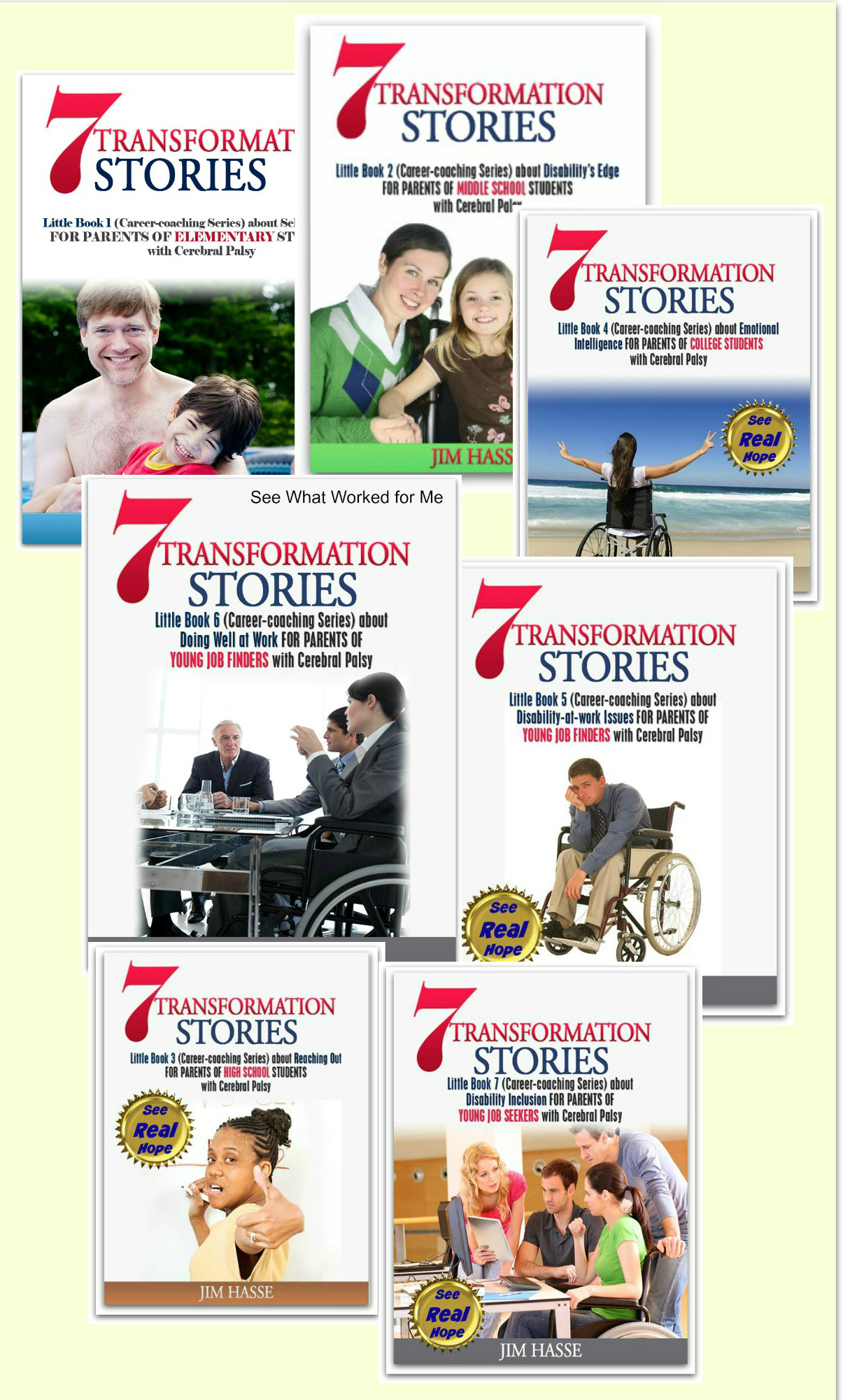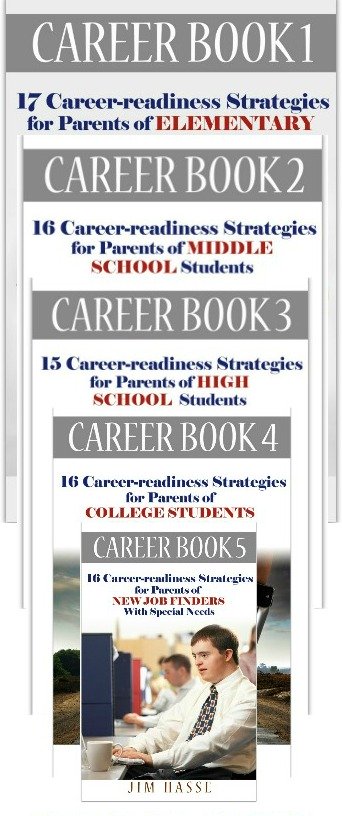Ticket to Work: Cerebral Palsy Career Builder for your Middle School Student
By Jim Hasse, ABC, GCDF, Disability Employment Expert
_________________________________________________________
Ticket to Work and PASS (Plan for Achieving Self-Support) are two Social Security Administration (SSA) work incentive programs your middle school student with cerebral palsy (CP) may need as a future job seeker.
The goal of both programs is to help individuals with disabilities achieve their vocational goals.
So, it’s not too soon for your youngster to start thinking about how either program (or both) can help him or her successfully make the transition from school to work.
My journey
As a 12-year-old, my immediate goal was to “go back home” to our “regular” local high school after spending seven years in orthopedic school in Madison, WI, 60 miles from our dairy farm.
I made it through high school, graduating second in my class and then earned a State of Wisconsin disability-assistance scholarship to attend what was then a state college in Platteville, WI.
Four years later, I graduated from the University of Wisconsin-Madison with a B.S. degree in journalism. There was no state department of vocational rehabilitation, no Ticket to Work and no PASS. I landed my first job where my uncle worked at the organization and the general manager of the company knew my mom.
In the last half of the 1990s when I was between jobs and trying to start my own business, Pam and I were living on savings and very little income. I remember our CPA asking us if I wanted to apply for Social Security Disability Insurance. I said no. I didn’t consider it a serious option at the time.
In 1996, I received a state enterprise grant to research the potential for training college students with disabilities about how to get hired upon graduation. The finding eventually led to the development of this website.
Today, I would urge you and your junior high school youngster to consider all of the available options for making the important transition from school to work. That includes exploring the potential in the incentives provided by Ticket to Work and PASS.

The programs
The goal of both the Ticket to Work program and the Plan for Achieving Self-Support (PASS) program is to help an individual reach a job goal and lessen (or even eliminate) dependence on disability cash payments.
The Ticket to Work program, implemented in 2002 and 2003, is a voucher-type program that is designed to provide job training and other assistance to SSI and Social Security Disability Insurance (SSDI) beneficiaries after they choose to work with an employment network (EN) or state vocational rehab agency.
Ticket to Work’s goal to help a beneficiary get a job. After the beneficiary goes through the job program and finds a job, the EN will receive a monthly payment from Social Security for up to five years, if the beneficiary stays employed.
Available since 1974, PASS is a saving and spending plan (in writing) that allows Supplemental Security Income (SSI) beneficiaries to set aside their own income and/or resources, other than SSI money, for a specified time in order to acquire skills, services or items needed to achieve a work goal.
For example, people might set up a PASS account to save money for college, vocational rehabilitation training, a new business, a computer, child care or a personal attendant or job coach.
Beneficiaries may choose to participate in one or both programs simultaneously.
Under the Ticket program, both the participant and the EN must agree to and sign a work plan. PASS is tailored to the individual and has no time limits. It is self-directing. Participants decide what they want, what they need and how they are going to do it.
For Ticket holders, services for developing a resume, if necessary, will be handled by the EN. A PASS participant must prepare and submit resumes for employment three months before the PASS is supposed to end.
Eligibility
People who would like to participate in the Ticket to Work program:
- Must be age 18 to 64 and be eligible for
disability payments.
- Must be in current pay status for monthly cash benefits.
- Must either have a permanent impairment or a
non-permanent impairment that is expected to improve.
- And must have undergone at least one continuing disability review.
An individual can qualify to receive a PASS, if:
- She has a specified work or self-employment goal
or is seeking vocational services for help in determining a work goal.
- She is between the ages of 15 and 65.
- She is currently receiving SSI or is eligible for
SSI due to CP or other disability.
- Or she will receive income (other than SSI) and/or resources to be set aside for a work goal.
Teenagers, at least age 15 but under age 18, may be eligible for PASS but not for Ticket to Work. They can use PASS money to earn a college education and acquire skills. Then, they can participate in the Ticket to Work program when they are eligible if they still need help in finding a job.
Effect on benefits
Under the Ticket program, an individual’s disability benefits will continue as long as that disability continues (probably no problem for your youngster with CP).
After a participant starts working, the earnings needed to eliminate the payment of disability benefits depends on a variety of factors.
As ticket holders, participants are able to be in the program and get a job while being exempt from continuing disability reviews as long as they continue to make “timely progress” toward vocational goals. People who just have a PASS will undergo continuing disability reviews, so their participation in Ticket to Work would enable them to avoid those reviews.
Money or resources in a PASS are not counted as income when determining eligibility for SSI or when calculating SSI payments.
Tips for effectively using both programs
Here are some recommendations I’ve collected from various
sources for effectively using PASS:
- Discuss PASS with “experts” before making a
financial commitment.
- Watch what is reported as income. Pell grants
and certain other educational funds don’t count as income.
- Keep in mind this distinction: PASS and Ticket
to Work are not mutually exclusive. Your future job seeker will be able to use
PASS and other work incentives to pay expenses that an EN can’t handle.
- Go for vocational rehabilitation counseling if
your youngster is unsure about a work goal when the school-to-work transition
approaches.
- Note this: Vocational evaluation can be a work
goal.
With Ticket to Work, ENs provide your youngster with employment, vocational rehabilitation and other services at their expense.
But, anyone can write your youngster’s PASS. It is best to contact the SSA office nearest you for a referral to a PASS specialist who can help your youngster develop a personal plan. Or, a vocational counselor, social worker or employer can do it.
Return from Ticket to Work to Career Test
Go to Cerebral Palsy Career Builders
This is Creative Commons content. You can freely and legally use, share and repurpose it for non-commercial purposes only, provided you attach this sentence and the following attribution to it (including the two links):
Originally written and illustrated by Jim Hasse, ABC, GCDF, owner of Hasse Communication Counseling, LLC, who, as a person with cerebral palsy, served for 10 years as a vice president in a Fortune 500 company during his 29-year career in corporate communication. He’s an Accredited Business Communicator, certified as a Global Career Development Facilitator and author of 14 Amazon books about disability awareness and disability employment issues.





